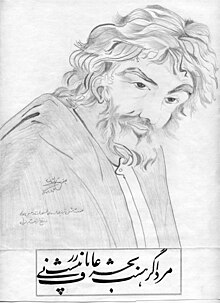Shams Tabrizi
Appearance

Shams-e-Tabrīzī (or Shams al-Din Mohammad, literally: Sun of Islam; 1185–1248) was a Nizari Ismaili Iranian Sufi mystic, born in the city of Tabriz in Iranian Azerbaijan, who is credited as the spiritual instructor of Mewlānā Jalāl ad-Dīn Muhammad Balkhi, also known as Rumi and is referenced with great reverence in Rumi's poetic collection, in particular Diwan-i Shams-i Tabrīzī (The Works of Shams of Tabriz). Tradition holds that Shams taught Rumi in seclusion in Konya for a period of forty days, before fleeing for Damascus. The tomb of Shams-i Tabrīzī was recently nominated to be a UNESCO World Heritage Site.
Quotes
[edit]Me & Rumi (2004)
[edit]- Maqalat-i Shams-i Tabrizi [Discourse of Shams-i Tabrīzī] as translated and annotated by William C. Chittick (2004)
- There may be one fault in a man that conceals a thousand qualities, or one excellence that conceals a thousand faults. The little indicates much.
- Intellect takes you to the door, but it doesn't take you into the house.
- The salat can be made up for, but there is no making up for false show or outward worship without presence.
- Whoever lives as he sees fit will not die as he sees fit.
- Alms in secret extinguish the wrath of the Lord means you are so immersed in sincerity and in preserving that sincerity that you have no pleasure in giving alms.
- You have to live with the people in hypocrisy for them to stay happy with you.
- He said The Sufi is the son of the moment.
- When you oppose the shaykh, it's like the slave who kills himself over a quarrel with his master. Hey, why are you killing yourself over a quarrel?
He says, So my master will suffer loss.
- Being the companion of the folk of this world is fire. There must be an Abraham if the fire is not going to burn [you].

